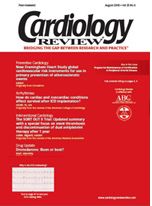The obesity epidemic: New therapeutic approaches
Obesity is considered by the World Health Organization to be a chronic disease and a massive public health problem. Abdominal obesity is particularly problematic as it relates to cardiovascular disease (CVD) risk. Although most of the relationship between abdominal obesity and CVD risk is mediated through the standard CVD risk factors, there does seem to be some additional risk imparted by abdominal obesity. These observations have led to the identification of the insulin resistance syndrome (or metabolic syndrome) characterized by abdominal obesity.
As a result of the obesity “epidemic,” a number of new therapeutic approaches are being investigated. Clearly, these new approaches have to be built upon a foundation of dietary restriction and lifestyle modification, but it is just as clear that these approaches alone are not satisfactory. One example of a new therapeutic intervention is orlistat (Xenical), an inhibitor of gastrointestinal lipase that reduces absorption of dietary fat by about 30%. Studies have confirmed the success of orlistat for weight reduction, and short-term studies have shown improved insulin sensitivity and cardiovascular risk profiles in Caucasian and Asian populations.
Interest in obesity interventions has also led to the discovery and exploration of the endocannabinoid system.1 One such cannabinoid receptor blocker under study is rimonabant (Acomplia), a CB1 receptor antagonist. To date, two cannabinoid receptors have been identified (CB1 and CB2). The endocannabinoids are produced on demand from the cell membrane; they act locally and are immediately metabolized. Overactivity of this system stimulates the hypothalamus with a resultant increase in appetite, and it stimulates the nucleus accumbens, which increases one’s motivation to eat and smoke, and peripherally affects adipocytes to increase fat accumulation.2 The relationship between this system and nicotine dependence is exemplified by observations that endocannabinoids are released by chronic nicotine use and that rimonabant decreases nicotine self-administration. In obese rodents, the endocannabinoid system becomes permanently activated in the hypothalamus, peripheral adipocytes, and the nucleus accumbens.
Rimonabant is one of the first selective antagonists of the CB1 cannabinoid receptors under intense study. Three multicenter, double-blind, placebo-controlled studies in obese patients have consistently reported weight loss, as well as improvements in CVD risk factors. The Rimonabant in Obesity (RIO)-Europe study was the largest of the three and presented 1-year follow-up.2 For this trial, 3,040 patients were randomly assigned to either placebo, or 5 mg or 20 mg of rimonabant. Participants receiving the 20-mg dose lost more than 19 lb (vs 5.1 lb in the control group). This was associated with a 24.5% increase in high-density lipoprotein (HDL) cholesterol (compared with 13.8% on placebo) and a greater than 7% benefit in triglycerides compared with placebo. In addition, there was an improvement in insulin sensitivity. These improvements were greater than what was predicted by the degree of weight loss, raising the hypothesis that there is an independent effect of CB1 blockade on CVD risk factors. In fact, the authors suggested that about half of the effect of rimonabant on HDL and triglycerides was independent of weight loss. In addition, the weight loss observed in 39% of the patients treated with the 20-mg dose was associated with a concomitant reduction in waist circumference of about 9 cm, a value that could be associated with a 30% decrease in intra-abdominal adiposity.
To date, the reported incidence of adverse effects is low. In the RIO-North America Study, for the 20-mg group, a slightly higher incidence of depression, anxiety, and irritability was reported. There was also more nausea reported in the 20-mg group.
Obesity is a manifestation of multifactorial origins, and future approaches to its management will undoubtedly surface. The endocannabinoid system is an important addition to our understanding of obesity and will likely lead to other avenues of exploration.
